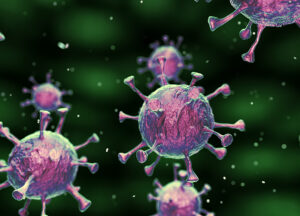It is important to realize that a recent study from Belize and Taiwan showed that SARS-CoV-2 is resistant to extreme cold and extreme heat.
Dr. Paul Morgan from the Faculty of Science and Technology in Belize was one author of the publication. Dr. Chih-Wen Shu from the National Sun Yat-Sen University, Kaohsiung, Taiwan was the other author. Together they tested 4 protein components of the SARS-CoV-2 virus. Notably, they showed thermal stability of the Covid-19 coronavirus. In detail, they tested the receptor-binding domain (RBD) of the spike glycoprotein, main protease, macrodomain X, and the nucleocapsid protein. Indeed, these are key proteins of the SARS-CoV-2 virus that the virus can use to latch on to cells in the respiratory tract.
The two authors employed molecular dynamics simulations to assess the effects on extreme temperatures on these 4 protein components. The temperatures tested were in the range of -18 °C to 49 °C (0.4 °F to 120 °F).
Details about the four protein components of the SARS-CoV-2 virus
Receptor-binding domain (RBD) of the spike glycoprotein
The SARS-CoV-2 spike glycoprotein allows the virus to bind to a cell receptor and undergo membrane fusion. In particular, the virus has an affinity with the angiotensin converting enzyme 2 receptor of the human host cells. In this case, an effective antiviral drug would prevent uptake of the virus.
Main protease
This protease is essential for the multiplication of the SARS-CoV-2 virus. Surely, it will be useful for the development of an antiviral agent and reduce the risk of drug resistance.
Macrodomain
This protein has the capability to weaken the immune system. However, a future antiviral drug that interferes with the macrodomain would allow the immune system to remain strong.
Nucleocapsid protein
The nucleocapsid protein is very immunogenic and is in this case considered to be a candidate for the development of future vaccines.
Details of the study
Both researchers noted that the 4 key proteins of the SARS-CoV-2 virus were extremely thermos-stable. On the one hand this is not good news regarding transmissibility of the virus. Originally researchers hoped that virus transmission would slow down in the summer. However, this was not the case. The other side of the thermos stability is that the protein structures are very stable. This may mean that 4 different medication groups could be developed that target each one of the tested protein components.
Conclusion
New research about 4 protein components of the SARS-CoV-2 virus showed that these protein particles are very thermos stable (not sensitive to cold or high temperatures). On the one hand this means that the Covid-19 coronavirus is very stable in its substructures. Transmission does not depend on seasonal temperature changes. On the other hand, this is good news with respect to the possibility of developing new antiviral drugs. Each of these 4 protein components can serve as a drug target that interferes with the latching on of the virus to lung and other cells.







